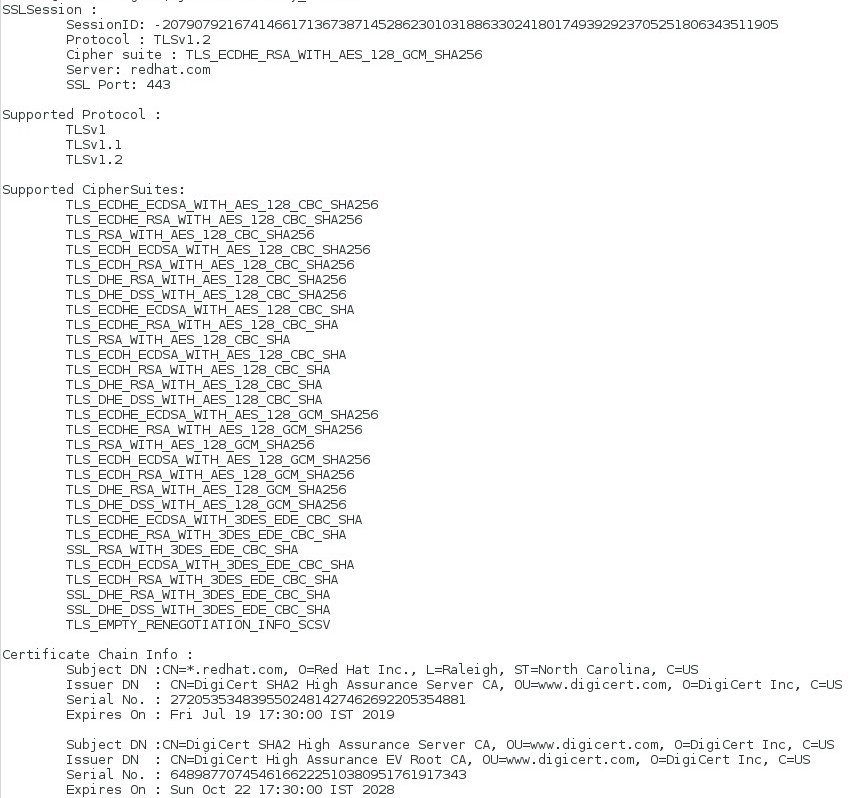If you have a large number of servers, which are configured with SSL/TLS and you are out of track on their certificate validity, now all of sudden you are worried if some of the certificates are expired.
Or if I think in some other scenario where you are required to understand underlying SSL/TLS configuration of your servers e.g. CipherSuits, Protocols, etc.
Yes, in the traditional way, you can get all the information of your SSL/TLS configuration by login into an individual server and check the certificates but it is very difficult if your environment size is very high.
To overcome this problem, I have to build a tool, which will give you all required details.
Source Code:
import java.io.FileInputStream;
import java.math.BigInteger;
import java.security.KeyStore;
import javax.net.ssl.KeyManager;
import javax.net.ssl.KeyManagerFactory;
import javax.net.ssl.SSLContext;
import javax.net.ssl.SSLSession;
import javax.net.ssl.SSLSocket;
import javax.net.ssl.SSLSocketFactory;
import javax.net.ssl.TrustManager;
import javax.net.ssl.TrustManagerFactory;
import javax.security.cert.X509Certificate;
/**
*
* @author sidd
**/
public class SSLFactory_Client {
public static void main(String[] args){
String hostname;
Integer port;
if(args.length!=2){
hostname = "google.com";
port = 443;
}else{
hostname = args[0];
port = Integer.valueOf( args[1]);
}
SSLFactory_Client sclient = new SSLFactory_Client();
SSLContext sslContext = sclient.createSSLContext();
try {
SSLSocketFactory sslSocketFactory = sslContext.getSocketFactory();
SSLSocket sslSocket = (SSLSocket) sslSocketFactory.createSocket(hostname, port);
sslSocket.startHandshake();
SSLSession sslSession = (SSLSession) sslSocket.getSession();
System.out.println("SSLSession :");
System.out.println("\tSessionID: "+ new BigInteger(sslSession.getId()));
System.out.println("\tProtocol : "+sslSession.getProtocol());
System.out.println("\tCipher suite : "+sslSession.getCipherSuite());
System.out.println("\tServer: "+sslSession.getPeerHost());
System.out.println("\tSSL Port: "+sslSession.getPeerPort());
System.out.println("\nSupported Protocol :");
for(int i=0;i<sslSocket.getEnabledProtocols().length;i++){
System.out.println("\t"+sslSocket.getEnabledProtocols()[i]);
}
System.out.println("\nSupported CipherSuites: ");
for(int j=0;j<sslSocket.getEnabledCipherSuites().length;j++){
System.out.println("\t"+sslSocket.getEnabledCipherSuites()[j]);
}
X509Certificate[] certs = (X509Certificate[]) sslSession.getPeerCertificateChain();
System.out.println("\nCertificate Chain Info :");
for (int i =0;i<certs.length;i++){
System.out.println("\tSubject DN :"+((X509Certificate) certs[i]).getSubjectDN());
System.out.println("\tIssuer DN : "+((X509Certificate) certs[i]).getIssuerDN());
System.out.println("\tSerial No. : "+((X509Certificate) certs[i]).getSerialNumber());
System.out.println("\tExpires On : "+((X509Certificate) certs[i]).getNotAfter()+"\n");
}
} catch (Exception ex) {
ex.printStackTrace();
}
}
private SSLContext createSSLContext(){
try{
KeyStore keyStore = KeyStore.getInstance("JKS");
keyStore.load(new FileInputStream("/opt/jdk1.8.0_102/jre/lib/security/cacerts"),"changeit".toCharArray());
// Create key manager
KeyManagerFactory keyManagerFactory = KeyManagerFactory.getInstance("SunX509");
keyManagerFactory.init(keyStore, "changeit".toCharArray());
KeyManager[] km = keyManagerFactory.getKeyManagers();
// Create trust manager
TrustManagerFactory trustManagerFactory = TrustManagerFactory.getInstance("SunX509");
trustManagerFactory.init(keyStore);
TrustManager[] tm = trustManagerFactory.getTrustManagers();
// Initialize SSLContext
SSLContext sslContext = SSLContext.getInstance("TLSv1.2");
sslContext.init(km, tm, null);
return sslContext;
} catch (Exception ex){
ex.printStackTrace();
return null;
}
}
}
Compile the code using javac (e.g. javac SSLFactory_Client .java).
Now, you can execute the program, you need to pass the hostname and port during the execution (e.g java SSLFactory_Client “google.com” 443) and you will get the output something like below.
Output:
Note: This program can also be used for testing two-way SSL/TLS connection.
Last updated: October 20, 2017
